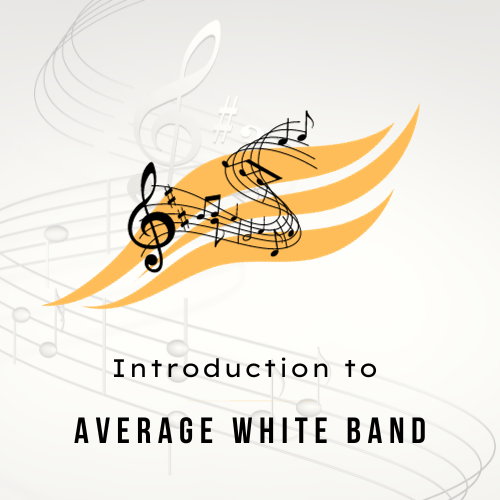The band’s career in summary
Average White Band (AWB) is a Scottish funk, disco, soul and R&B band that had their biggest success from 1974-1980. The 1974 band consisted of Malcolm “Molly” Duncan (tenor saxophone), Roger Ball (keyboards, saxophone), Onnie McIntyre (vocals, rhythm guitar), Alan Gorrie (guitar, bass guitar and vocals), Hamish Stuart (guitar, bass guitar and vocals) and Robbie McIntosh (Drums). McIntosh died of an accidental heroin overdose at a party in 1974 and was replaced by Steve Ferrone. The groups first album, “Show Your Hand,” on MCA Records was not successful. They then signed Bruce McCaskill as their manager, he had been Eric Clapton’s road manager. The band signed with Atlantic Records ain 1974 and released the “AWB” (also known as “The White Album”), which was produced by renowned producer Arif Mardin, who produced many hit artists (Aretha Franklin, Phil Collins, John Prine, Jewel, to name a few). The album reached #1 on The Billboard 200 album chart and contained the #1 Billboard Hot 100 crossover hit single “Pick Up The Pieces”, of which band member Roger Ball was the prominent writer, even though the rest of the band gets writing credits. The follow up album “Cut The Cake”reached #1 on the Billboard 200 and was their most successful album with three Top 40 songs, “Cut The Cake”, “If I Ever Lose This Heaven” and“School Boy Crush”. The next album, “Soul Searching,” peaked at #9 on the charts with only one top 40 hit “Queen Of My Soul”. From that point the bands U.S. popularity began to diminish as each following album charted lower with no top 40 singles. The band still records and performs live concerts, Gorrie and McIntyre being the mainstays, with different band members coming and going.
Other AWB hit songs: “A Love Of Your Own”, “Cloudy”, “Get It Up”, “Your Love Is A Miracle”, “Walk On By”, “When Will You Be Mine?”, “Let’s Go Round Again”, “For You, For Love”, “Let’s Go Round Again” (Remix), “Down to the River”, “Welcome to the Real World”, “The Spirit Of Love”, “A Star In The Ghetto”, “Soul Searching”, “Work To Do”, “I’m the One”, “Person to Person”, “Easier Said Than Done”, “Stop the Rain”, “Our Time Has Come”, “Into the Night” and “I Just Can’t Give You Up”.
Formation of AWB
Average White Band (also known as AWB) was formed in Dundee, Scotland in 1972. The founding members consisted of Alan Gorrie (bass and vocals), Hamish Stuart (guitar), Onnie McIntyre (guitar), Malcolm Duncan (tenor saxophone), Roger Ball (keyboards and saxophone) and Robbie McIntosh (drums).
The following year, the band opened for Eric Clapton in the latter’s comeback concert, leading to a wider interest from the audience and more exposure. Soon they released their debut album Show Your Hand (on MCA Records label) which sold poorly.
First big hit at home and in the US, and death of McIntosh
Average White Band later took on their abbreviated moniker AWB, which also became the title of their sophomore LP released on Atlantic Records imprint in 1974. It turned out to be enormously successful in their home country, the United Kingdom (reaching at #6 there), and even more so in the United States. It topped the US Billboard 200, thanks to its single “Pick Up the Pieces,” which also went #1 on the Billboard Hot 100 (while it also peaked at #6 on the UK singles chart and #5 on the US R&B).
In the midst of their newfound success though, the Average White Band faced tragedy through the death of their drummer McIntosh. He died of accidental heroin overdose at a party in Hollywood, in September 1974. McIntosh was replaced by Steve Ferrone, formerly of Bloodstone.
Subsequent recordings
In 1975, Average White Band released their third LP Cut the Cake, which went to #28 on the UK album chart and #4 on the US Billboard 200. The album’s title track just made it to the Top Ten of the Billboard Hot 100, while its following singles “If I Ever Lose This Heaven” and “School Boy Crush” went to #39 and #33, respectively, on the same chart.
In 1976, Average White Band released their fourth studio LP Soul Searching. Once more, it had much more impact in the US (at #9) than in their homeland, where it only peaked at #60. It featured two singles, “Queen of My Soul” which made a dent on the US Top 40, the band’s last foray into that said chart. Another single “A Love Of Your Own” peaked at #35 on the US R&B chart. Also that same year, Average White Band released their first live album Person to Person, which peaked at #28 on the US Billboard 200.
Disbandment and re-formation
The following year, Average White Band released their fifth studio album Benny & Us, which featured their collaboration with American soul singer Ben E. King. It was followed by Warmer Communications (1978) and Feel No Fret (1979) which went to #28 and #32, respectively. But 1980’s Shine and 1982’s Cupid’s in Fashion failed commercially. Average White Band initially spilt in 1982, and several members went on to their separate music projects. Ferrone went on to collaborate with Duran Duran, while Stuart started to record and tour with Paul McCartney.
The three other members — Gorrie, Ball and McIntyre — re-formed Average White Band in 1989, with new vocalist Alex Ligertwood for the release of the albumAftershock. Ball quit shortly after the album’s release. Ligertwood spent a few good years with the band before leaving in 1996. The following year, AWB released their eleventh studio album Soul Tattoo. In 2003, they released their last studio album to date, Living In Colour. The group still performs up to this day.
Average White Band’s material has been among the most sampled by several other artists, including the Beastie Boys, Arrested Development, Ice Cube, TLC, and A Tribe Called Quest, among so many others.
